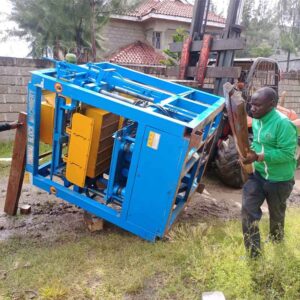
Title: **Revolutionizing Transparency: Blockchain Applications for Full-Automatic Block Supply Chain**
Introduction:
In the era of Industry 4.0, the integration of cutting-edge technologies is reshaping traditional supply chain models. For the full-automatic block manufacturing industry, where precision and transparency are paramount, blockchain technology emerges as a transformative force. This article explores the myriad applications of blockchain in ensuring transparency and traceability within the supply chain of full-automatic block products.
1. **Immutable Record-Keeping:**
Blockchain, as a decentralized and distributed ledger, provides an immutable record of transactions throughout the full-automatic block supply chain. Every step, from raw material sourcing to production and distribution, is recorded in a secure and unalterable blockchain. This ensures transparency and accountability, reducing the risk of fraud or tampering within the supply chain.
2. **Traceability of Raw Materials:**
Blockchain allows for the transparent traceability of raw materials used in full-automatic block production. Each batch of materials, whether aggregates, cement, or additives, can be assigned a unique identifier recorded on the blockchain. This traceability feature ensures that the origin, quality, and sustainability credentials of raw materials are readily accessible, fostering trust among stakeholders and end-users.
3. **Smart Contracts for Supply Chain Automation:**
Smart contracts, self-executing agreements with predefined rules written into code, enable automation of supply chain processes in the full-automatic block industry. From procurement to payment, smart contracts can streamline and automate various stages of the supply chain. This not only enhances efficiency but also reduces the likelihood of errors and disputes, contributing to a smoother and more transparent workflow.
4. **Real-Time Monitoring and Visibility:**
Blockchain provides real-time monitoring of the full-automatic block supply chain. Stakeholders, including manufacturers, distributors, and retailers, can access a shared, up-to-date view of the entire supply chain process. This transparency enhances visibility, allowing for proactive decision-making, optimized inventory management, and timely responses to potential issues.
5. **Quality Assurance and Certifications:**
Quality assurance is a critical aspect of full-automatic block manufacturing. Blockchain enables the secure storage of quality-related data, including test results, certifications, and compliance documents. This information is accessible to all relevant parties, ensuring that every block adheres to industry standards. The immutability of the blockchain also makes it a reliable source for validating the authenticity of certifications.
6. **Supplier Collaboration and Trust:**
Blockchain fosters collaboration and trust among suppliers in the full-automatic block supply chain. By providing a shared platform for transparent and verifiable information exchange, blockchain reduces the need for intermediaries and minimizes the risk of disputes. This collaborative approach enhances the overall resilience and efficiency of the supply chain.
7. **Reducing Counterfeiting and Fraud:**
The transparency provided by blockchain significantly reduces the risk of counterfeiting and fraud in the full-automatic block supply chain. Every transaction and movement of blocks can be traced, ensuring that counterfeit products are easily identified and eliminated from the supply chain. This not only protects the reputation of manufacturers but also enhances the safety and reliability of the end product.
8. **Environmental and Sustainability Tracking:**
Blockchain enables the tracking of environmental and sustainability metrics throughout the full-automatic block supply chain. From the use of recycled materials to energy-efficient manufacturing processes, these sustainability factors can be recorded on the blockchain. This transparent documentation allows manufacturers to showcase their commitment to eco-friendly practices, meeting the growing demand for sustainable construction materials.
Conclusion:
Blockchain technology stands as a cornerstone for enhancing transparency, traceability, and efficiency in the full-automatic block supply chain. By leveraging blockchain applications, the industry can build a resilient and trustworthy ecosystem that not only meets the demands of modern consumers but also aligns with global standards for sustainability and transparency. As the technology continues to evolve, its integration into the full-automatic block supply chain is poised to redefine the industry’s approach to transparency and accountability.
